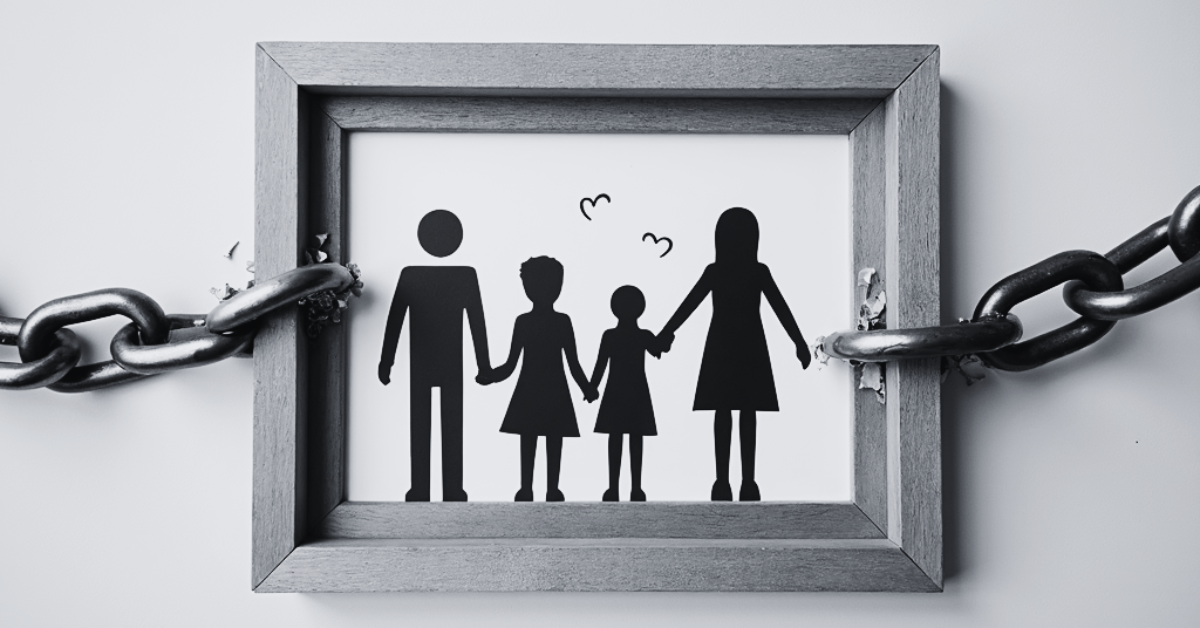How to protect your peace, stop guilt-tripping yourself, and finally say no without apology!
Some families hammer the idea that loyalty means putting up with anything — even abuse. Growing up, many are taught that parents and elders are owed lifelong allegiance, regardless of how they treat you.
The truth? Just because someone raised you doesn’t mean they have unlimited access to your peace of mind. Setting boundaries with toxic family members, including parents, is sometimes the only way to protect your well-being.
Society often shames people for choosing themselves over family. This post unpacks why that guilt is so heavy, how to tell when your family is toxic, and concrete steps for building boundaries.
If you’re tired of emotional manipulation by family, feeling guilty for cutting off family, or wondering how to handle toxic family situations, you’ll find practical advice and plenty of tough love here. You might also want to explore how to stop caring what people think if fear of judgment has kept you stuck.
The Reality of Toxic Family Relationships
Toxic family dynamics can be subtle or obvious, but the common thread is disrespect for your boundaries, feelings, or autonomy.
Toxic relatives might use guilt trips to get their way, gaslight you until you doubt your version of events, or wield money and favors as a way of keeping you under control.
Controlling relatives demand obedience, shame your choices, and tear you down with constant criticism until you barely recognize yourself.
Maybe your mother ignores your boundaries by calling dozens of times a day, insisting it’s because she cares. Narcissistic family members refuse to apologize or turn every issue back on you.
Some toxic parents in adulthood threaten to cut support unless you do what they want. Even frequent silent treatment, passive-aggressive commentary, or subtle digs add up. Family boundaries are broken not just by yelling or outright cruelty, but also by repeated emotional erosion.
Over time, these patterns can leave you questioning your own sense of self. Many people who endure toxic relatives experience anxiety, depression, and trouble trusting others in future relationships.
What may start as family drama can evolve into deep-seated wounds, making it that much harder to break free from the cycle. Recognizing these dynamics early makes it easier to protect yourself and rebuild your confidence.
Why It Feels So Wrong to Set Boundaries with Family (Even When It’s So Right)
The grip of family guilt runs deep. Childhood conditioning trains many to be obedient, quiet, and grateful. Standing up to toxic parents can feel like breaking the rules of loyalty, especially in cultures or families where elders are always right.
If you’ve spent years trying to keep the peace, this might be a sign of deep-rooted people-pleasing patterns you’re ready to break.
There’s the “they did so much for me” trap, reminding yourself of every meal, roof, or holiday as if that cancels out ongoing harm.
Fear of being labeled as ungrateful or selfish, or being shunned by the family, keeps people stuck. Religious or cultural values can pile on the guilt, shaming those who create space from toxic relatives.
No contact with toxic family or even stating your needs often brings judgment from extended family, friends, or the wider community. This fear of judgment and loss can make the idea of setting boundaries with toxic parents or other relatives feel impossible.
When everyone around you values family no matter what, it takes real courage to break the cycle and put yourself first.
It’s important to remember that boundaries are not about punishment; they are about protecting yourself. Guilt and fear are natural, but honoring your needs sets the stage for genuine healing.
Signs a Boundary or Hard Exit Is Needed
- You feel anxious, angry, or drained before or after talking to toxic relatives
- You’re blamed for family problems that aren’t yours to fix
- Simple requests for space or respect are ignored or mocked
- Family members use your past, secrets, or mistakes as weapons
- You can’t say no without being punished emotionally, financially, or through gossip
- Patterns repeat themselves no matter how many times you’ve tried to talk things out
- Your self-worth crumbles after each interaction, and you dread gatherings or phone calls
If any of these sound familiar, setting boundaries with family isn’t selfish — it’s protection and self-care from toxic relatives. Sometimes walking away or going low or no contact is what it takes to guard your peace.
Knowing when enough is enough is personal. If every interaction leaves you feeling worse and setting simple boundaries is met with hostility, it’s okay to create distance. Your well-being matters, and you don’t have to stick around just because someone is family.
How to Set Boundaries with Toxic Family Without Explaining Yourself
Setting boundaries with toxic family can start with clear, straight sentences. There is no need to explain yourself in detail or beg for understanding. Here are some script examples:
- I’m not available for that conversation
- I won’t discuss my relationships or finances with you
- I need time to myself right now
- Please do not raise your voice at me. If it happens again, I’ll end the conversation
- My answer is no
Boundaries only work if they are clear and consistent. It’s common for toxic family members to resist, ignore, or violate these limits at first. Pushback often indicates that a boundary is needed. You don’t need buy-in or understanding from the other person, and their reaction does not determine if your need is valid.
Keep your words direct and avoid getting pulled into arguments. Practice staying calm and repeating your boundary as needed. Documenting these conversations, if safe, can help you stay clear and grounded. Remember, the goal isn’t to change their mind; it’s to give yourself the security and peace you deserve.
Sometimes it helps to rehearse your statements ahead of time or to write them down so you don’t stumble when tensions are high. Knowing your own reasons for the boundary provides a solid foundation, regardless of the pushback you may experience. If saying no feels awkward or scary, check out this no-bullshit guide to saying no for practical scripts and confidence boosts.
How to Deal with the Aftershock: Guilt, Gaslighting & Going No Contact
After you put boundaries in place, fallout is almost guaranteed. Toxic relatives may gaslight you (“You’re overreacting”), launch emotional attacks (“No one else treats their mother this way”), or resort to the silent treatment. Shame might come from all sides, including inside your own head.
The feelings of guilt for choosing yourself over family or walking away from toxic family are real, but remind yourself that they do not reflect your worth. Surround yourself with supportive friends, a therapist, or online communities who understand toxic family dynamics. Practice self-validation by affirming your reasons and keeping a journal if that helps.
If direct contact continues to harm, no contact with toxic family may be the only way forward. Sometimes absence is the answer. Full stop. You don’t owe lifelong access to anyone who poisons your peace.
There are resources available, including books on boundaries, online forums dedicated to toxic family situations, and therapists specializing in family issues. Adding new supportive influences can tip the scale back in your favor, especially when old patterns try to resurface.
Healing After Toxic Family Trauma
Breaking free from toxic family relationships can leave lasting wounds. It’s common to grieve the version of family life you deserved. Acknowledge that loss. Seeking therapy can help process both the pain and the guilty feelings around boundaries.
Rebuilding self-worth takes time. Focus on finding or building your chosen family — people who respect, encourage, and care for you. This could mean friends, mentors, or support groups. Small daily acts of self-respect and celebration help heal the damage left by controlling relatives.
Reflection Prompts
- What do I wish my family could have offered me as a child? How can I give that to myself now
- What is the kindest thing I can do for myself this week
- Who in my life boosts my energy instead of draining it
Healing is a journey, not a single decision. Sometimes there are setbacks or moments of doubt. Each step you take toward prioritizing yourself is a step toward freedom. With patience and self-compassion, the grip of toxic family dynamics does loosen. And if you’re realizing that your life was built around other people’s expectations, it might be time to burn the checklist and rewrite your own rules.
Key Reminders for Dealing With Toxic Family
- Family boundaries are healthy, necessary, and can be reset at any stage of life
- Toxic family dynamics are not your fault; healing is your right
- When your family is toxic, it’s okay to choose yourself over tradition or expectations
- Setting boundaries with toxic parents or relatives creates space for growth and peace
- Emotional manipulation by family loses its power when you stop playing the same role
- You are not responsible for their feelings, only your own healing and safety
If putting yourself first still feels selfish, read The Selfish Myth: Why It’s Fucking Necessary to dismantle the guilt once and for all.
Subscribe to The Fuck You Mindset Newsletter
Unbothered. Unfiltered. Unapologetic. Straight to your inbox.
Ready to Stop Letting Family Guilt Run Your Life?
If you’re done being the emotional dumping ground, the fixer, the one who always keeps the peace — it’s time to flip the script.
This weekly wake-up call delivers raw, no-bullshit insights to help you:
- Set boundaries without guilt
- Shut down manipulation
- Rebuild your confidence
- Finally, put your peace first
No shame. No sugarcoating. Just real tools for living unapologetically on your own terms.
Enter your email below to join the rebellion.
(P.S. Check your inbox and spam folder to confirm your spot — we don’t chase people.)
More No-Bullshit Reads to Back Your Boundaries
Check out these posts for more tough love, clarity, and self-respect strategies:
- Stop Giving a Fuck: How To Stop Caring What People Think (and Start Living)
- Burn the Checklist: Escaping the Life Script You Never Wrote
Drop the Guilt. Share the Truth.
Sick of walking on eggshells with family? Tell your story below. Vent. Celebrate your boundary wins. Support someone who’s finally ready to choose peace over guilt.
Leave a comment below!!!

